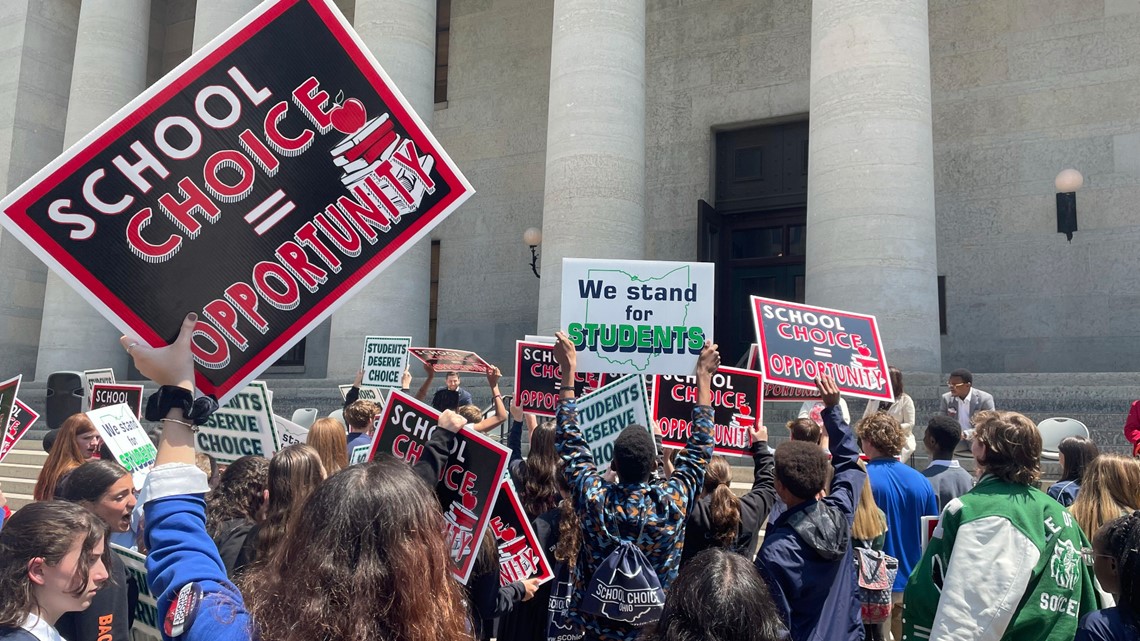Proposals would bring dramatic change to Ohio's voucher program
Ohio parents could see more public money in their pockets next year to help send their children to private and religious schools, or to fund homeschooling. Ohio parents could see more public money in their pockets next year to send their schoolchildren to private and religious schools, or fund homeschooling, under changes to a voucher program that state lawmakers and the governor must hammer out by month’s end. The changes would come after learning setbacks prompted by pandemic-era education disruptions, cultural battles over gender and race, and a national movement for parental rights have led to a larger push in Ohio and other states to make them more widely available. The Republican-dominated Ohio House cleared its version of the $88 billion budget in April, which raised the eligibility threshold to up to 450% of the federal poverty level, or $135,000 for a family of four, sending the bill to the GOP-led Senate to debate. Meanwhile, lawmakers’ analysts at the nonpartisan Legislative Service Commission estimate extending voucher eligibility could cost up to an additional $344 million over the next two years. The Ohio Senate recently asked the GOP state Auditor Keith Faber to investigate how much money those schools are using to fund the lawsuit, which sparked immediate outcry from voucher opponents.

Published : 2 years ago by Author: Associated Press in
Ohio parents could see more public money in their pockets next year to help send their children to private and religious schools, or to fund homeschooling.
Example video title will go here for this video
COLUMBUS, Ohio — Ohio parents could soon see more taxpayer money in their pockets to help send their schoolchildren to private and religious schools, or fund homeschooling, under changes to a voucher program that Republican state lawmakers and the governor must hammer out by month’s end.
Ohio has had some form of vouchers since 1996, but learning setbacks prompted by pandemic-era education disruptions, cultural battles over gender and race, and a national movement for parental rights have led to a larger push in Ohio and other states to make them more widely available.
School vouchers are state-funded and distributed through the Ohio Department of Education's EdChoice Scholarship Program. Children are eligible if they attend certain underperforming public schools or come from low-income households — at or below 250% of the federal poverty level, or about $75,000 a year for a family of four.
In January, via his version of the state budget, GOP Gov. Mike DeWine announced a proposal to increase income eligibility for vouchers to those at or below 400% of the federal poverty level, or about $111,000 for a family of four.
The Republican-dominated Ohio House cleared its version of the $88 billion budget in April, which raised the eligibility threshold to up to 450% of the federal poverty level, or $135,000 for a family of four, sending the bill to the GOP-led Senate to debate.
Dubbed “backpack bills” because the funding follows students wherever they go, both legislative proposals seek to make vouchers available to all of Ohio’s K-12 students, regardless of income, whether their schools are considered underperforming and even if they already attend chartered private schools.
Meanwhile, lawmakers’ analysts at the nonpartisan Legislative Service Commission estimate extending voucher eligibility could cost up to an additional $344 million over the next two years. That’s assuming that all of the approximately 30,000 newly income-eligible students already attending private schools take vouchers.
The Ohio Senate recently asked the GOP state Auditor Keith Faber to investigate how much money those schools are using to fund the lawsuit. Faber agreed and sent out a survey asking public schools to disclose such funds.
But that move sparked immediate outcry, with voucher opponents calling the survey an act of witness intimidation by lawmakers. Republican Senate President Matt Huffman called it finding out “what the hell is going on.”
Topics: Ohio
